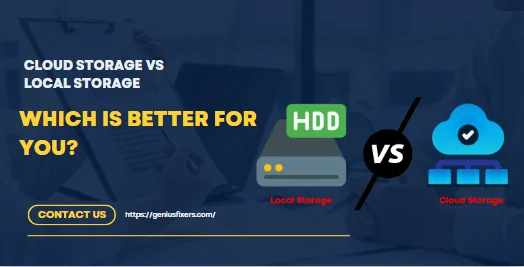Empowering Businesses with IT Solutions

Cloud Storage vs. Local Storage – Which Is Better for You?
Client contact details, financial records and purchase histories are some of the instances of business data. It is crucial for companies to look after them for continuity or survival. Nevertheless, the modern era of technological development has brought two significant storage sorts.
Here, you will grasp their differences by reading their pros and cons. This is pertinent for knowing which is best for your business.
Introducing Cloud Storage
Here, we will try our utmost best to provide you with the simplest explanation of cloud storage. It massively depends on the internet, rather than your computer or other devices you own, such as smartphones. All of your essential business files will be thus on the internet.
In technical terms, organizations can store their data by using services of a cloud storage provider. The information online then becomes easier to access from wherever the employees want.
Moreover, among this data, it is not merely the documents we are talking about. Such storage is compatible with applications, images and even videos. Examples of cloud storage are Google Drive, Apple iCloud and Microsoft OneDrive.
There are multiple storage choices available in this regard.
Private Cloud: A business can have complete control over this kind of service. In fact, the internal team manages everything, and hence, it is only accessible to the staff. This is beneficial in terms of enhanced security.
Public Cloud: Different individuals and companies can access these services. They are quite feasible in terms of price too. The companies famous for providing these offerings are Google and Amazon.
Hybrid Cloud: Finally, there is hybrid cloud, which is a blend of aforementioned types. Both customization and protection is possible to acquire by the businesses this way.
Advantages
- One of the perks is scalability. As the business and needs change, cloud providers help you increase or decrease storage space. In fact, there are various plans for it. You do not have to purchase hardware to save an excessive number of files.
- This is a very cost-effective alternative. You will solely pay for the storage space you are using.
- You can access your imperative business data any time you require. This is because of its reliance on the internet. Wherever there is internet connectivity and the right skills, the accessibility to information becomes easier.
- This gives remote workers an opportunity. They do not have to be physically present near business storage devices merely to access the information.
- If you lack technical skills, you can always find an MSP to help your business. Just ask us about our cloud services to learn more.
Disadvantages
- Businesses have to depend a lot on the internet. If the latter is slow or not working at all, accessing crucial files can become impossible.
- Cloud is still prone to security breaches, no matter how hard the providers are trying to secure their solutions. Therefore, if there is sensitive information on cloud storage, it is surely vulnerable to cyber threats.
- Opting for a new cloud storage provider is a complicated task. Thus, you have to hire someone to do this job, ultimately leading to an expenditure.
- Although you can relish cost-efficiency, there are still chances of unexpected price plan changes.
What Is Meant by Local Storage?
In contrast, there is local storage, which allows you to save your important files directly on your devices. Therefore, there is hardly any dependency on the internet. Your employee’s phone storage is an eminent example.
This basically links to the physical part of your device, such as, anything your staff downloads from the internet goes into the computer hard drive. It does not have to be uploaded beforehand.
Businesses can have or run data centers, servers, and workstations that are valuable for this purpose.
Plus Points
- Businesses do not have to rely on the internet or steady internet connectivity to store their information. This is particularly advantageous when the internet seems expensive or inaccessible.
- The loading time is faster than that of cloud storage. Traditional storage just requires switching on your phone or laptop for accessibility.
- Whether it is about backup or organization, you are the ultimate boss. This is in reference to physical control.
- You are not entrusting a third-party provider. Thus, such data remains more secure than its substitute.
- There is an absence of ongoing subscription costs. Therefore, you do not have to pay the provider to use the devices for storage purposes.
Limitations
- Your business data is restricted to a physical location or device. Thus, accessibility is not possible from a different place or computer.
- If your devices containing information encounter damage, you might lose that data as well. Extreme temperatures or drops are the explicit causes. More include thefts.
- If not the internet, then physical storage hinges on power sources to operate. Thus, this is not portable for all kinds of situations.
- Traditional storage can make remote collaboration difficult.
Wrapping Up
The aforesaid content very brilliantly defined two prime approaches for storing data: cloud storage and local storage. They both bring along their pluses and negative sides.
For instance, the former type is suitable for scalability and easy access to storage space. In comparison, traditional storage gives the business good control over it.
FAQs
Is cloud storage a better pick for my business than local storage?
Well, you have to make your priorities the foundation for such a selection. Nevertheless, typically, businesses are preferring cloud storage nowadays, mainly due to its scalability and cost-effectiveness.
How can Genius Fixers help with local and cloud storage?
Well, analyzing your needs and recommending the best option is one thing we can do effortlessly. Moreover, our cybersecurity services are ideal for securing data, regardless of the storage method you pick.
We also offer backup and disaster recovery or BDR services, which is useful in creating backups of your vital data.
What are the limitations of cloud storage?
The sole dependency on the internet is one of the highlighted disadvantages of this approach. Also, it is vulnerable to security breaches and you will have lesser control.

